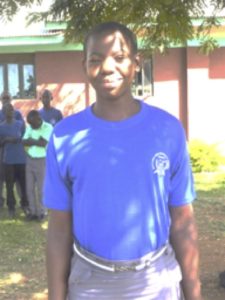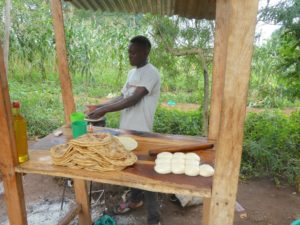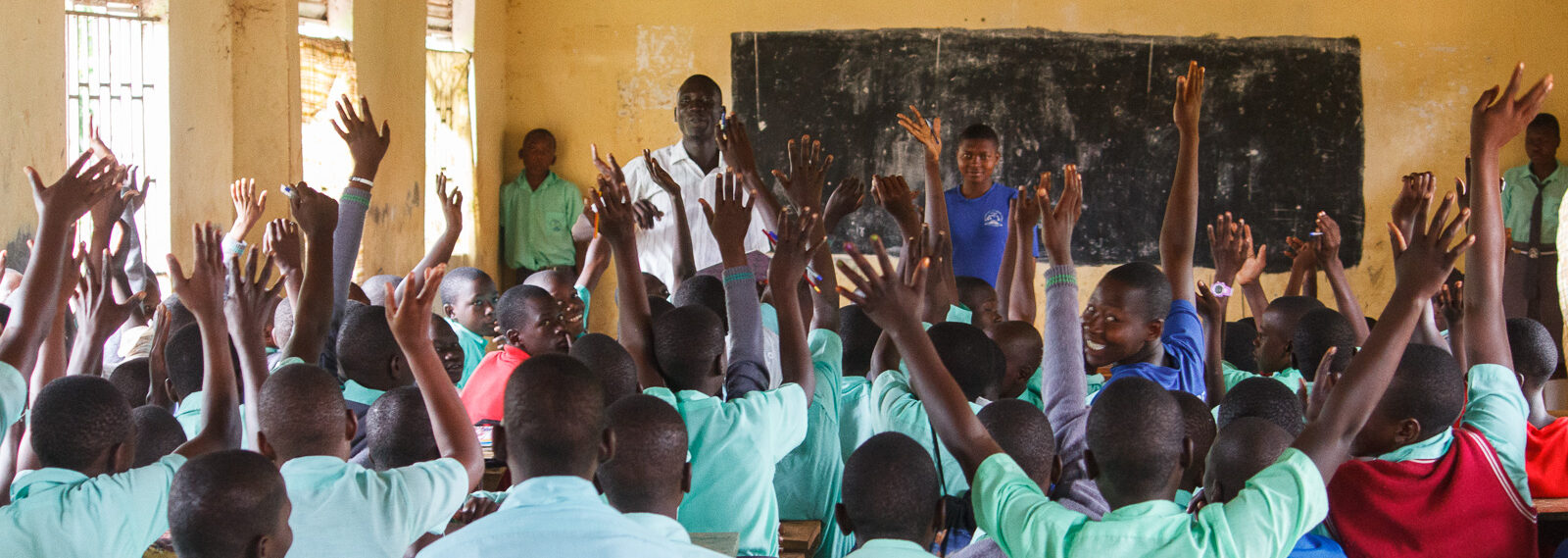The 2019 Uganda Certificate in Education (O-Level) results for the Humanist Schools, published recently, showed a further improvement on the previous year. Improving educational standards at Isaac Newton and Mustard Seed Schools see them rising up the school league tables. The two schools are giving more and more young people from poor backgrounds the life changing opportunity that a good education based on positive values can bring.
- Each school entered just over 100 students for the exam in 2019. 56.2% of the students of Isaac Newton gained either an aggregate grade 1 or 2 (just over double the national figure). 34.6% of Mustard Seed students gained this level, compared with 26% nationally.
- The only failures in the two schools were a handful of students who could not, due to family difficulties, complete their final year of schooling. Nationally 12.8% of students fail outright.
- It is particularly pleasing that both schools bring up more of the weaker students to at least a Grade 3. Where nationally just below half of the cohort (43%) gain the lowest level pass at grade 4. At Mustard Seed only 2% gained the lowest grade pass and over 60% gained a creditable grade 3, compared with 23 % nationally. At Isaac Newton just 16.2% gained the lowest pass grade.
- For both schools there was a substantial improvement in the overall profile of grades since 2018. (See table of results below)
Moses Kamya, the Director of Mustard Seed School, points out that many of their students have performed well despite difficult personal circumstances.
 “One of our girls who has done particularly well is Viola Mbeiza. Her father died, so Viola lived with her Mum. After doing well at primary school, she stayed at home for a year because she had no money for secondary school fees. I heard her story and offered her a UHST scholarship to study at Mustard Seed. Viola loves the school and thrived with us but then disaster struck in her second year. She sustained serious back injuries after falling into a pit at home. She needed ongoing medical attention and missed a lot of school. However, Viola always made up her schoolwork, and her determination was rewarded when she passed O level with the highest division 1. A local politician has managed to secure sponsorship to enable Viola to move on to a course in nursing and midwifery.
“One of our girls who has done particularly well is Viola Mbeiza. Her father died, so Viola lived with her Mum. After doing well at primary school, she stayed at home for a year because she had no money for secondary school fees. I heard her story and offered her a UHST scholarship to study at Mustard Seed. Viola loves the school and thrived with us but then disaster struck in her second year. She sustained serious back injuries after falling into a pit at home. She needed ongoing medical attention and missed a lot of school. However, Viola always made up her schoolwork, and her determination was rewarded when she passed O level with the highest division 1. A local politician has managed to secure sponsorship to enable Viola to move on to a course in nursing and midwifery.
Simon Baidu has also completed his secondary schooling with us. He was also raised by a single mum. They lived in a simple house in Busota trading centre. She earns a meagre income selling chapatis at our school. Simon was a day student.  He would occasionally help his mum to roll a single egg omelette in a chapati to make Rolex, not a watch but a popular local street food. Simon’s primary schooling was poor, so he joined the school in S1 with only a third grade in his primary leaving certificate. We would not normally accept someone with such a low grade, but Simon had something about him that suggested promise. We were delighted when he gained a Grade 1 in his O-level examinations and, even more so, when he secured a scholarship to study for his A-levels at a good school in Jinja. His mum is so happy at his achievement. His success, when he gets a job, could help to lift the whole family out of poverty.”
He would occasionally help his mum to roll a single egg omelette in a chapati to make Rolex, not a watch but a popular local street food. Simon’s primary schooling was poor, so he joined the school in S1 with only a third grade in his primary leaving certificate. We would not normally accept someone with such a low grade, but Simon had something about him that suggested promise. We were delighted when he gained a Grade 1 in his O-level examinations and, even more so, when he secured a scholarship to study for his A-levels at a good school in Jinja. His mum is so happy at his achievement. His success, when he gets a job, could help to lift the whole family out of poverty.”
Aggregate
Grade (%) |
Uganda |
Mustard Seed Secondary |
Isaac Newton High |
|
2018 |
2019 |
2018 |
2019 |
2018 |
2019 |
| 1 |
8.4 |
8.4 |
8.0 |
5.0 |
16.4 |
20.0 |
| 2 |
16.0 |
17.6 |
21.4 |
29.6 |
30.2 |
36.2 |
| 3 |
21.3 |
23.2 |
29.3 |
60.4 |
30.1 |
26.6 |
| 4 |
41.5 |
43.0 |
41.3 |
2.0 |
23.3 |
16.2 |
| Fail |
12.8 |
7.8 |
0.0 |
3.0 |
0.0 |
1.0 |
Roughly 330,000 students take the exams in Uganda.
Mustard Seed cohort increased from 75 in 2018 to 101 in 2019, and Isaac Newton’s increased from 73 to 105.

Posted: March 21, 2020 by Steve Hurd
Humanist Schools give young people a lifeline to a better future
The 2019 Uganda Certificate in Education (O-Level) results for the Humanist Schools, published recently, showed a further improvement on the previous year. Improving educational standards at Isaac Newton and Mustard Seed Schools see them rising up the school league tables. The two schools are giving more and more young people from poor backgrounds the life changing opportunity that a good education based on positive values can bring.
Moses Kamya, the Director of Mustard Seed School, points out that many of their students have performed well despite difficult personal circumstances.
Simon Baidu has also completed his secondary schooling with us. He was also raised by a single mum. They lived in a simple house in Busota trading centre. She earns a meagre income selling chapatis at our school. Simon was a day student. He would occasionally help his mum to roll a single egg omelette in a chapati to make Rolex, not a watch but a popular local street food. Simon’s primary schooling was poor, so he joined the school in S1 with only a third grade in his primary leaving certificate. We would not normally accept someone with such a low grade, but Simon had something about him that suggested promise. We were delighted when he gained a Grade 1 in his O-level examinations and, even more so, when he secured a scholarship to study for his A-levels at a good school in Jinja. His mum is so happy at his achievement. His success, when he gets a job, could help to lift the whole family out of poverty.”
He would occasionally help his mum to roll a single egg omelette in a chapati to make Rolex, not a watch but a popular local street food. Simon’s primary schooling was poor, so he joined the school in S1 with only a third grade in his primary leaving certificate. We would not normally accept someone with such a low grade, but Simon had something about him that suggested promise. We were delighted when he gained a Grade 1 in his O-level examinations and, even more so, when he secured a scholarship to study for his A-levels at a good school in Jinja. His mum is so happy at his achievement. His success, when he gets a job, could help to lift the whole family out of poverty.”
Grade (%)
Roughly 330,000 students take the exams in Uganda.
Mustard Seed cohort increased from 75 in 2018 to 101 in 2019, and Isaac Newton’s increased from 73 to 105.
Posted: February 1, 2020 by Steve Hurd
Uganda Humanist Schools: A Growing Movement
All the schools were founded by Ugandans with Humanist values and a strong commitment to the needy communities they serve. Most schools are rural, some quite remote and a number in areas where many family members have died in the most tragic of circumstances.
All schools share the aim of offering a safe, caring and effective learning environment for children who have experienced poverty and insecurity. The Humanist Schools accept a duty of care to every student, who has the right to expect:
Furthermore, education in Humanist Schools encourages:
Uganda Humanist Schools Trust is organising an International Friendship Visit to some of these schools in August 2020. There will also be an opportunity to attend the 3rd Uganda Humanist Schools Conference at Isaac Newton High School. Places are limited but if you wish to support the schools in their endeavours, are fit and healthy and have the endurance to cope with challenging journeys then please contact stevehurd@uhst.org for further information.
Posted: December 26, 2019 by Steve Hurd
Cutting the turf on the new Katumba Nursery School
We have just heard from Juma Siriwayo that construction of a brand new primary school for the Katumba community on the Congo border of Uganda has started with foundation work on the Nursery section. Weather conditions have been challenging. Very heavy rains have hindered progress. Floods have washed out two key bridges on the road to the school site. Lorries carrying building materials are having to take side roads and ford the River Humya to deliver materials on site.